- Home
- Al Sarrantonio
Totentanz Page 13
Totentanz Read online
Page 13
Death! he screamed, using not his lungs because there was nothing in his lungs to make the word with, but his soul. Death! he screamed, and their astonished faces must have thought he was speaking of his own, though he meant theirs. The death of Montvale was what he beseeched—and then the fear and hatred consumed and ate him up, and the sky turned black, the world was pulled away like elastic and the black dropped down around him, and that voice, that voice, was once more beside him, breathing into his mouth, fanning the flames of hate and fear and at the same time sucking them out of him, saying "Yes" to his prayer of death, the mouth of this thing on his mouth
Jeff Scott heard laughter, and he looked up from the floor of his trailer to see Ash's shape looming over him. Ash was in the trailer with him, but he also seemed to be everywhere else, occupying the whole frame of Jeff's mind as well as his vision. For a moment it seemed that Ash's face was pressed to his, that fishlike, slit red mouth on his own, but this was only a memory, and then he looked up and saw Ash's shape, distinct and man-sized now, turn from him and walk to the door of the trailer.
"I'll be back for you soon," Ash said, still chuckling, and the door to the trailer opened, not quite banging shut before Ash continued, "You'll be ready." And Jeff Scott, in despair, knew it was true.
TWELVE
It was going to happen again.
Frances knew that now, knew it so deep in her bones that her body quaked with the knowledge. The barber pole was just a barber pole now; not the Northern Star, the red and white of His passion and pain, His protecting veil over her. There was only the open Book before her, open to the last page of the last chapter, where the screaming things of judgment were—the screaming red things that would not go away and would only die and die.
Would this finally be the last time he made her witness?
Other times came to her: a long, white, empty boat, the sound of booming gun blasts fading over the long water and a spreading red-ink stain over the bow and stern, spreading to meet the horizon. . . . A high tower, the misleading pop of rifle shots, a mother trying to fall protectively over her baby carriage and then falling down to the concrete: another rifle crack and then another. . . . A lick of night flame creeping up the side of a tent and whipping around the base and rising up with a sonic boom to form a ball of hell that grew and grew, engulfing everything, the animals, the circus, the spectators.
Him I mourn. . . .
Where was Jeb now? Where had he been then? She wanted him to be here, to tell her it was all right, that Ash would not come back, that what they had done was not wrong, that it would happen no more, that those faces in the flames, those horrible, surprised faces, would not stare at her anymore.
It's going to happen again.
"Frances?"
"Jeb?"
The voice came soft and soothing, like Jeb's voice when he was kind, when she was sick that time with the measles, when he came and covered her with a blanket and then made the doctor come out to their place against his will, the doctor who cringed when he entered the house, looking at the paintings on the walls, trying to make small talk as he bent over her, his hands trembling as he examined her, waiting for perhaps the hammer blow on his head or worse, wanting only to leave, to leave even his bag and run back to town, to be away from them. She was sure it must be Jeb's voice.
"Frances?"
She knew it was Ash before she turned around. He could make his voice soft if he wanted to, could do anything with it that he wanted: make it sound like animals, like a train whistle at night, a cricket, a mouse, the sigh of chilly wind, like a roaring ball of fire.
"What do you want?"
"It's time, Frances.–
His voice was not as soft now. It would change, soon, to something as long and white as a knife, and as hungry.
It will happen again.
"What do you want?" she repeated.
"You know what I want," he answered. His voice still soothed. "This will be better than the first time. Do you remember the first time, Frances?"
"I don't—" she began, but she remembered, and then Ash was gone and she didn't remember. She was in a white place. At first she thought it was heaven, the heaven that Jeb had sometimes talked about with fear and longing on his face. He always made sure she went to church. He insisted she go, even walking with her as far as the dirt path that led up to the steps of the clapboard chapel. He never went in himself. She would sometimes sit by one of the stained windows with a little clear glass at the bottom and look out at him, standing straight against the oak tree by the front gate. He stood tall, and his head was thrown back. In a strange, cold way, he seemed to be praying. She asked him once, on one of those Sunday mornings that always smelled like Sunday, with sharp, wooden-bench smells in the air, along with coffee and flowers in the spring, or in the winter with a cold clean smell, and he looked at her and told her about heaven.
"Go to church when I tell you, read His Book, and go to heaven when it's time," he said. "Love only life." He would say no more. It was Jeb who had given her her Bible, and he took it from her now, showing her the passages he wanted her to know, the ones he had outlined with a shaking pencil, the ones he had made her say over and over until she had memorized them:
I am the resurrection, and the life: he that believeth in me, though he were dead, yet shall he live: and whosoever liveth and believeth in me shall never die.
And also:
. . . by his death he could take away all the power of he who had power over death, and set free all those who had been held in slavery all their lives by the fear of death.
That day he locked himself in the barn and painted, and just before sunset she heard him yelling and breaking things, his voice rising to a horrid screech like a dog's yowling. There was a huge, tearing crash followed by silence. She tried to open the barn door, and then his voice came clear and icy, more icy than ever before.
"Come in and I'll kill you," he said. He stayed in the barn for two days. When he came out, she did not go near him for nearly a week.
But the white place she was in now was not heaven. It was quite like heaven might be, but when she looked close, she saw that even this was an illusion. The walls were dirty. At one time, after they had just been painted, they must have been very white, but now there were streaks on them, smudges and tiny red dots.
She was not alone. Around her there were others dressed in white, sitting up in bed and staring at the ceiling or walls or doing things with their hands. Some picked at imaginary bits of dust. One young girl was hitting herself on the leg repeatedly, in the same spot, in rhythm: another was trying to tear out her hair but could not reach her head because her hands were tied to the sides of the bed. There were flies everywhere. A dirty screen window was ajar, leaning against the bars that formed the real window. There was a door at one end of the room, white, with a lot of stains on it and a small glass porthole.
"We were going to kill you," a chilling voice said from Frances' left. The face was young, fifteen, perhaps sixteen, with blonde hair pulled straight back and knotted, giving the head a skeletal appearance; the face was thin and emaciated. The eyes were gray-blue steel, the gaze the most direct Frances had ever seen.
The lips pulled away from the girl's teeth, showing a crooked bite and a few gaps. They looked as shark-like as if they had been two level rows of razors.
"We were going to climb on you while you were asleep and rip the flesh from your body with our mouths. We weren't going to use our hands." The girl tried to gesture, but her hands were bound loosely to her sides with straps, giving her only a few inches of movement. Her nails were bitten almost to the cuticles. "All of us here, every one. We would have gulped your blood through our teeth and then spit it out." Her razor-thin lips pulled back even farther. "We would have done it, too," the girl continued, "only the doctor told us not to. He wants you himself." Then she turned her head away, snapping it downward, trying to gnaw at her left hand, barely reaching the fingers to rip at a small bit of skin.
What am I doing here? Frances thought. And then, in a panic, she realized that she didn't remember anything about herself.
When she tried to move, she discovered that she, too, was bound to her bed. She could move her hands and arms, but the lower part of her body was securely fastened.
The girl in the bed next to hers was once again smiling at her from her serpent-like head.
"Please let me out!" Frances shouted, hoping that someone might hear her through the door and open it. Instead, there was instant silence in the room. Every face turned toward her. "Please!" she yelled again. "Please let me out!"
The blonde girl began to laugh. Her voice started as a low, dry tick, quickly working up to a lurid squeal. The others in the room followed her, and soon the entire ward was filled with rabid laughter.
A face appeared at the porthole in the door and then retreated. Abruptly the door was pushed open and two men came in, scared, pinched looks on their faces. Behind them was another man, hard-looking, and he had a hose in his hands. He held it loosely draped across one arm with the nozzle in one hand. When Frances saw the hose, the nozzle, something opened in her mind and she remembered who she was; there was something horrible about a hose. . . .
The two attendants walked briskly up one side of the room and down the other, holding up their hands for silence. The noise only increased. One of the men motioned to the third, who brought the hose into the room and made a signal behind him, out into the hallway. The hose hissed and swelled and then the nozzle came to life, sending out a hard spray of water. The man expertly swiveled it back and forth. Some were hit in the chest, some in the face. The flood of water knocked Frances back against her pillow, and for a moment it filled her mouth and she was unable to breathe, or even to see. She gagged, and when she was about to lose consciousness, the stream turned to the next bed. She was left gasping and drenched. When the man with the hose finished, he left the room and the other two followed close behind him.
Before long Frances was shivering in her bed, unable to move. Everything was soaking wet: the bed, the pillows, her nightgown and the sheets. She waited for something to happen, but nothing did. The others around her were stunned into silence, most of them turned on their sides, pulled into balls, hands around their knees to retain warmth. The screen had been knocked aside, and swarms of bugs were finding their way into the room. It was late afternoon now, and a cool breeze drifted in, only adding to the dampness.
Frances tried to curl up like the others. She could not stop shaking; her teeth were rattling, and the sheets felt like lead upon her body. The shadows on the side of the window lengthened as the sun began to set.
There was a commotion outside the door. An argument was going on in the hallway; someone was yelling loudly, and someone else was answering in a gruff, low voice. “Don't believe . . ." a voice shouted, and then the door swung open.
Someone flicked a light switch, and a long neon light that stretched the length of the room flickered into life. "Holy Christ!" the loud voice said, and there were tramping footsteps into the room. You think this is a goddamn zoo?" The other voice, the gruff one, said, "No," and then the first voice said, after a pause. "Which bed is she in?" The other voice mumbled something.
Frances saw that they were approaching her bed. She tried to close her eyes, but the presence of the two men standing over her was too strong and she opened them. She caught a glimpse of the man with the strong voice just as he was turning away from her. His features were as solid as his voice; his face was full and squarish with a broad nose, and he had a head of thick, graying hair. His eyes were powerful and slate-gray.
"Good God Almighty!" the man screamed at his companion. He raised his hand as if to strike him, and then lowered it, regaining his composure. "I should fire you for this. Get new linen for everyone—I don't care if you have a coffee break or go off in half an hour or whatever in hell," he said, cutting off a complaint the other man began. "Just do it or you're out."
The orderly turned away, and the man with the gray eyes bent over Frances. She looked up into his face. He was startled for a moment, but then his face suddenly expanded into a warm smile.
"I see you're with us now."
She shivered in answer.
"I know you're cold. We'll take care of that. When did you wake up?"
Mutely, she continued to stare up at him.
"If you can speak to me, I can get you out of this ward."
In shivery breaths, she said, "I can talk."
"Don't worry," he said. His eyes held what looked like kindness, which she hadn't seen in a long time. "We'll take care of you. You really shouldn't be in here, but there was nowhere else to put you." He looked around at the other girls in the ward; they were beginning to come out of their stupor; some were staring at Frances and the doctor; others were involved in their own pursuits, trying their bonds. The girl who had been hitting her leg resumed her monotonous activity.
The doctor said wryly, "This is a state hospital. Since you were in a coma, there didn't seem to be anything else to do with you." And then his face grew solemn. "Do you know how long you've been here?”
Frances stared at him, unblinking.
"You're nineteen years old. You've been in this bed for four years."
Frances shivered, looking up at him steadily. "Do you have the Book?" she said suddenly.
His eyebrows frowned, but he kept the warm smile.
"I don't understand."
"Jeb told me to always read it."
Dawning comprehension came into the doctor's eyes. He looked up at the doorway, where the orderly, along with two women from the laundry, were entering with a cart. He motioned them over to Frances' bed.
He said to her, "We'll see what we can do about getting you a Bible. And into another room. We have some talking to do, Frances."
Frances nodded as the doctor stood up.
The girl with the piercing blue eyes in the bed next to hers sat bolt upright and began to scream.
"Fuck her! Then let us eat her flesh! Fuck her! Fuck her now!"
The doctor talked in a low voice to the orderly, who left the room and returned a moment later with a tray. The whole ward began to scream again. Some of the girls lashed their bodies back and forth against their bonds; the girl who was pounding her leg continued to do so, each hard, dull whack audible as her body swayed, her mouth open to emit a continuous, unthinking shriek.
"Fuck her! Fuck her!"
The orderly began to administer shots, starting with the bed by the door. When he came to Frances, he looked at the doctor, who seemed to consider for a moment and then nodded. Frances felt a jab in her cold, wet arm. The screams and other noises, the pounding of the girl's clenched fist on her leg, began to fade. She heard one last tearing cry from the girl in the bed next to hers before she heard nothing. . . .
She was in another white room, this one whiter than the other. Was this heaven? She remembered speaking of the Book to the doctor. Perhaps that speaking, her last act, had been enough to redeem her abomination in His eyes. Perhaps this was finally redemption. This whiteness was pure, unblemished—but then she saw that there were corners where the white met, forming walls and a ceiling.
She pushed herself up in the bed. There was a window in this room, with bars set into it, and a real screen securely fastened on it. There was a moth on the screen. Slowly it lifted its wings and then quickly let them fall. She was alone. The bed was white; the door was white with silver hinges, a regular door, without a porthole in it. But there was no knob on it. She was warm, dressed in a new linen, a starched white robe fastened at the top and back with white cloth strips. The bed was warm and dry, too. Through the window she could just make out the top of an oak; its leaves had started to turn. She heard bird sounds outside, sounds as though the birds were making ready for winter.
There was a small table with a smooth wooden top next to the bed. There was a white lamp on it. Next to the lamp was a book.
It was the
Book. Carefully she lifted it and brought it to her lap. It was heavy, and she almost dropped it. The black, rough-grained cover felt thick in her fingers. She pulled at it, and saw a marker opening to:
I am the resurrection, and the life; he that believeth in me, though he were dead, yet shall he live; and whosoever liveth and believeth in me shall never die.
A fierce trembling began in her body. It was a trembling of mingled fear and joy, for these were the words that had suckled her, had held up for her the only hope for her salvation. These were the words by which she knew that He watched over her. Without these words, she was lost. A sob escaped her throat. She dropped the Book into her lap, holding her hands up to the ceiling and closing her eyes, letting rapture enshroud her. There was redemption possible; He would bring it to her. He would shield her—
"Frances?"
The door to the room opened and then closed again. Someone stood there motionless. Frances felt a surge of fear and then one of joy—maybe this was heaven after all, and He had heard her heart, had come to her Himself.
"Frances, my name is Doctor Payton."
It was not Him. And this was not heaven. But at least it was not the other come to her, he whom she sought to push away. At least it was not he who had the power over her.

 Five World Saga 01 Hornets and Others
Five World Saga 01 Hornets and Others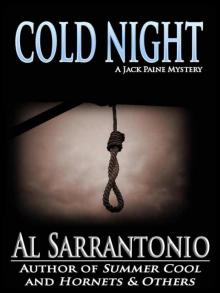 Cold Night (Jack Paine Mysteries)
Cold Night (Jack Paine Mysteries) Haydn of Mars
Haydn of Mars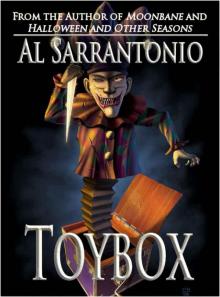 Toybox
Toybox Queen of Mars - Book III in the Masters of Mars Trilogy
Queen of Mars - Book III in the Masters of Mars Trilogy Exile
Exile Summer Cool - A Jack Paine Mystery (Jack Paine Mysteries)
Summer Cool - A Jack Paine Mystery (Jack Paine Mysteries) Return - Book III of the Five Worlds Trilogy
Return - Book III of the Five Worlds Trilogy The Orangefield Cycle Omnibus
The Orangefield Cycle Omnibus Summer Cool jp-2
Summer Cool jp-2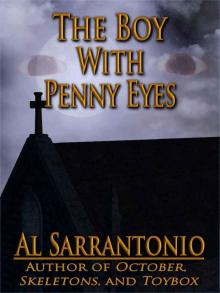 The Boy With Penny Eyes
The Boy With Penny Eyes Journey - Book II of the Five Worlds Trilogy
Journey - Book II of the Five Worlds Trilogy Kitt Peak
Kitt Peak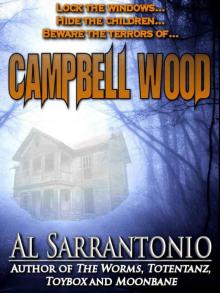 Campbell Wood
Campbell Wood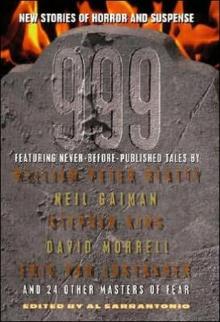 999
999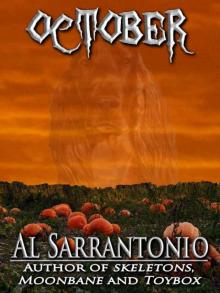 October
October Sebastian of Mars
Sebastian of Mars Moonbane
Moonbane Totentanz
Totentanz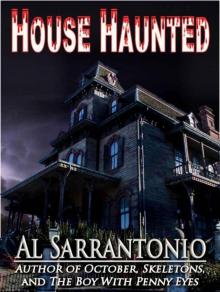 House Haunted
House Haunted Halloweenland
Halloweenland Hornets and Others
Hornets and Others